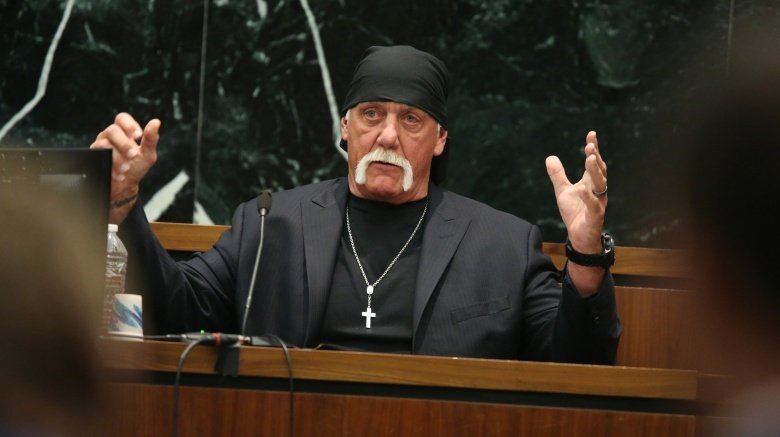The Greatest Acts Of Revenge On People Ever
Meir Kahane once said, "no trait is more justified than revenge in the right time and place." The subjects of this article would certainly agree, and in spades. In the hopes of instilling the fear of karma in your heart, here are some insane examples of justice taken to its extreme limit:
Woman buys tank to slaughter Nazis who killed her husband
Mariya Oktyabrskaya was a telephone operator, the wife of a Soviet army officer, and the proud owner of a T-34 tank, with which she used to kill enough Nazis in World War II to earn her the title of "Hero of the Soviet Union."
After the outbreak of war, Mariya was evacuated to Siberia, while her husband went off to fight. He was killed almost immediately, though the news didn't reach Mariya until nearly two years later. Driven by rage, and with nothing left to lose, Mariya sold her house and belongings in exchange for a T-34, which she donated to the Soviet Union under the condition that she be the one to drive it.
The Defense Committee, realizing the publicity opportunities, agreed to the deal, and after a few months of training, Mariya and her "Fighting Girlfriend" joined the 26th Guards Tank Brigade as a driver and mechanic. Though her unit was initially skeptical of what they saw as nothing more than a publicity stunt, their opinions quickly changed after her first battle, in which she eliminated numerous machine gun nests, artillery guns, and the Nazis who manned them. When her tank was hit and immobilized by heavy enemy fire, she immediately jumped out to repair it. For this action, she was promoted to Sergeant, though "Goddess of Steel" might have been more apropos.
Unfortunately, after many battles and many dead Germans, her luck caught up with her in January 1944. She was killed during a battle near the village of Shvedy, while making yet more repairs to her immobilized tank. She did not, however, die before eliminating several machine gun nests, trenches, a self-propelled gun, and yet more Nazis for good measure.
Montgomery Meigs makes Robert E. Lee's home untennable by making it a cemetery
Prior to the Civil War, deceased military personnel were buried at either the Soldiers' Cemetery in Washington, D.C., or Virginia's Alexandria Cemetery. But in May of 1864, these sites were quickly overcrowding, soldiers were still dying en masse, and a new cemetery was needed stat. Enter Montgomery C. Meigs, the Union quartermaster in charge of the new cemetery. A southerner by birth, Meigs opposed secession, sided with the Union, and hated Robert E. Lee for not doing the same.
The new cemetery, he decided, would need to be a plot high in elevation, aesthetically pleasing, and with a clear view of the District of Columbia. All of these requirements, he discovered with glee, just so happened to be met by Robert E. Lee's nearby abandoned Arlington House. In converting the property into a cemetery, Meigs made it his personal goal to fill it with so many bodies, it would be completely unlivable for Lee upon his return.
At first, he simply lined the flower garden with plots of dead officers. Once he realized the house was still inhabitable that way, Meigs ordered even more dead soldiers be sent there, with orders that they be scattered in various locations about the property. His plan was a success, as Lee never even attempted to return. Today, with over 400,000 gravestones, what's now known as Arlington National Cemetery stands as a military mecca for honoring those who gave the ultimate sacrifice.
Warren Buffett buys an entire company just to fire one man
In a world of trickle-down economics and corporate bailouts, it's hard to see much redeeming value in the fat-cats on Wall Street. However, Warren Buffett's buyout of an entire corporation, simply to fire one corrupt exec who screwed him on a contract deal is so petty, we just have to applaud the man.
In 1962, Buffett began buying stock in textile conglomerate Berkshire Hathaway. However, with the price per share in steady decline, Buffett and Hathaway chairman Seabury Stanton made an oral agreement that Stanton would buy back Buffet's shares at $11 1/2 per share. But when Stanton presented the contract in writing, Buffet noticed that the price had been reduced to $11 3/8. If you don't understand the stock market, just know that, in that scene, 1/8 of a dollar is a lot to squawk about.
Insulted by Stanton's undercutting, Buffet responded by ... buying more stock. So much stock, in fact, he became majority owner of the company. His first act of business? Fire Stanton. Don't cross the future boss. And what of the failing company? Although Buffett has since described the buyout as both an act of spite and the "dumbest" investment he'd ever made, Berkshire Hathaway now stands as the fifth-largest public company in the world.
Lord Byron counters dog ban with pet bear
Notoriously flamboyant and wickedly talented, Romantic poet Lord Byron once described himself as "such a strange melange of good and evil that it would be difficult to describe [him]." And although any number of incidents from his life of hedonism are worthy of publication, arguably the most outrageous is his revenge against Cambridge's ban on dogs.
An animal lover to the extreme, Byron owned many unusual pets throughout his life, including badgers, foxes, peacocks, herons, monkeys, and everything in between. But none was more beloved than his Newfoundland dog, Boatswain. When his University instituted a ban on dogs, Byron's feathers were ruffled. In a geniusly stupid exploitation of a loophole (the ban did not extend to species outside of the common canine), Byron went and adopted a full-grown bear, leashing him on a chain and walking him around campus. It was rumored that he even went so far as to let the bear sleep in his room with him.
When questioned on what he would do with his new pet, Byron suggested that he'd apply for the bear to join his college, stating: "I have got a new friend, the finest in the world, a tame bear ... they asked me what I meant to do with him, and my reply was, 'he should sit for a fellowship'." Although Byron never actually enrolled the bear in classes, the University was forced to allow its stay on campus, as there was no rule against it.
Musician avenges the death of his broken guitar with series of viral videos
In March 2008, singer/songwriter David Carroll was chilling at Chicago's O'Hare airport, when he overheard a fellow passenger shout "My God! They're throwing guitars out there!" And the passenger was right. The baggage handlers were throwing guitars, and other instruments, out there with careless abandon. One was David's, a $3500 710 Taylor now too damaged to play. Upon bringing this up to the flight attendant, Carroll was redirected to the "lead agent," who immediately denied she was a "lead agent" and disappeared into the crowd. Carroll then spoke with a ticket agent, who dismissed his complaint with, "but hun, that's why we make you sign the waiver."
When Carroll explained he never signed a waiver, he was given the runaround yet again, with instructions to take it up with the ground crew. But due to his plane's late arrival, there was no ground crew. Ultimately, Carroll tracked down United Airlines' headquarters, who denied responsibility and refused to compensate him.
It would prove to a costly mistake for United. Carroll channeled his rage and frustration into a series of music videos subtly titled "United Breaks Guitars." Immortalizing the airline's callous indifference to its customers in song, Carroll went viral, amassing almost 20 million views and causing United stock to plummet by 10 percent, totaling about $180 million lost. The moral here: do your job, take responsibility for your mistakes, and don't ever get between a musician and their music.
Computer genius hacks his own stolen computer, humiliates thief
Mark Bao was already creating and selling computer apps by the fifth grade. At eighteen, he'd created threewords.me, a site with a simple premise (to describe your friends in three words), and was looking to sell to free up time for other start-ups. Point being, he's good with computers. So when his laptop went missing, he was able to remotely access the hard drive and get to the bottom of the mystery, himself.
What he found was equal parts cringe and satisfaction. In the brief window of time following the theft, the thief had recorded an embarrassing video of himself dancing awkwardly. Bao posted the video to Reddit and Youtube, where an audience of two million viewers publically ridiculed the thief. Realizing he'd been had, the thief then sent Bao a message apologizing and begging him to take the video down. Bao happily refused, telling his fellow Redditors "[the thief] isn't in a position to bargain."
Genghis Khan wipes a whole empire off the map in a trade deal gone wrong
Though many documents have detailed the ultra-violent nature of Genghis Khan, no one incident surpasses his reaction to the killing of his caravan of interpreters. See, during the 1200's, Kwarezmia was a bustling, powerful,and super-rich empire spanning the majority of Greater Iran. Seeing the potential for a trade partner, Khan extended an offer of peace to the Shah — he even went so far as to acknowledge their authority, sending interpreters to the Kwarezmian city of Otrar with a message to the governor: "you rule the rising Sun and I rule the setting Sun."
It had all the beginnings of a great partnership. So when Khan received word that his messengers and interpreters had been seized and killed, he naturally assumed it was a mistake and sent a second caravan to repeat the message. This time, the Kwarezmians responded by shaving the beards of the messengers and cutting off the head of the interpreter.
Realizing it was no error in communication, an enraged Khan sent an army of 200,000 men to initiate what would come to be known as the Mongol Invasion of Central Asia. The Mongols overwhelmed the Shah's army, despite being outnumbered 5-to-1. They destroyed the capital city of Gurganj, killed countless citizens just for being there, and poured molten gold down the throat of the governor. (Think Viserys' death in Game of Thrones, but way worse.)
But the slaughter didn't end there. After killing and enslaving hundreds of thousands of the empire's inhabitants, Khan dammed and rerouted the Oxus river, effectively flooding and wiping the entire city of Kunya Urgench off the map. What we're saying is: the man had a temper.
Billionaire and wrestler take down Gawker
Pro wrestler and entertainer Hulk Hogan revealed his most devastating take-down move of all time when it came to getting some very publicized payback against Gawker. In 2012, the website published a video of and story about Hogan (real name: Terry Bollea) having a sexual encounter with the then-wife of his then-friend Todd Alan Clem, better known as radio personality Bubba the Love Sponge. The encounter/video/story ended the marriage and the friendship.
Hogan sued Gawker Media and owner Nick Denton for infringing upon his privacy rights with the post, and was awarded $140 million in actual and punitive damages by the St. Petersburg, Florida, jury that decided the case. Gawker appealed the verdict, but in the meantime, Univision bought the company for $135 million and shuttered Gawker.com, which had been active for almost 14 years, while maintaining its sextet of sister sites: Gizmodo, Jezebel, Deadspin, Lifehacker, Jalopnik, and Kotaku. Later on, in November 2016, Gawker and Hogan settled for $31 million, which is still a huge blow to Gawker, especially since the settlement also dictates that several juicy Hogan-centered stories (including the one about his sex tape) be wiped off the internet permanently.
As if that weren't a punishing-enough blow, the real brains behind the the operation were revealed to be the Silicon Valley billionaire who funded Hogan's legal crusade. Peter Thiel, co-founder of PayPal and an early investor in Facebook, was revealed to have financed the lawsuit against Gawker, a site which he had his own perceived vendetta against: in 2007, one of Gawker's subsidiary sites had published an exposé about Thiel's sexual orientation, titled "Peter Thiel is totally gay, people."
However, Thiel told The New York Times that his behind-the-scenes involvement with Hogan's lawsuit was not an act of "revenge" but "more about specific deterrence" and that he was simply trying to defend lesser fortunate individuals from the wrath of the site. "I saw Gawker pioneer a unique and incredibly damaging way of getting attention by bullying people even when there was no connection with the public interest," Thiel told the Times. "Most of the people they attack are not people in my category. They usually attack less prominent, far less wealthy people that simply can't defend themselves. ... Even someone like Terry Bollea who is a millionaire and famous and a successful person didn't quite have the resources to do this alone."





